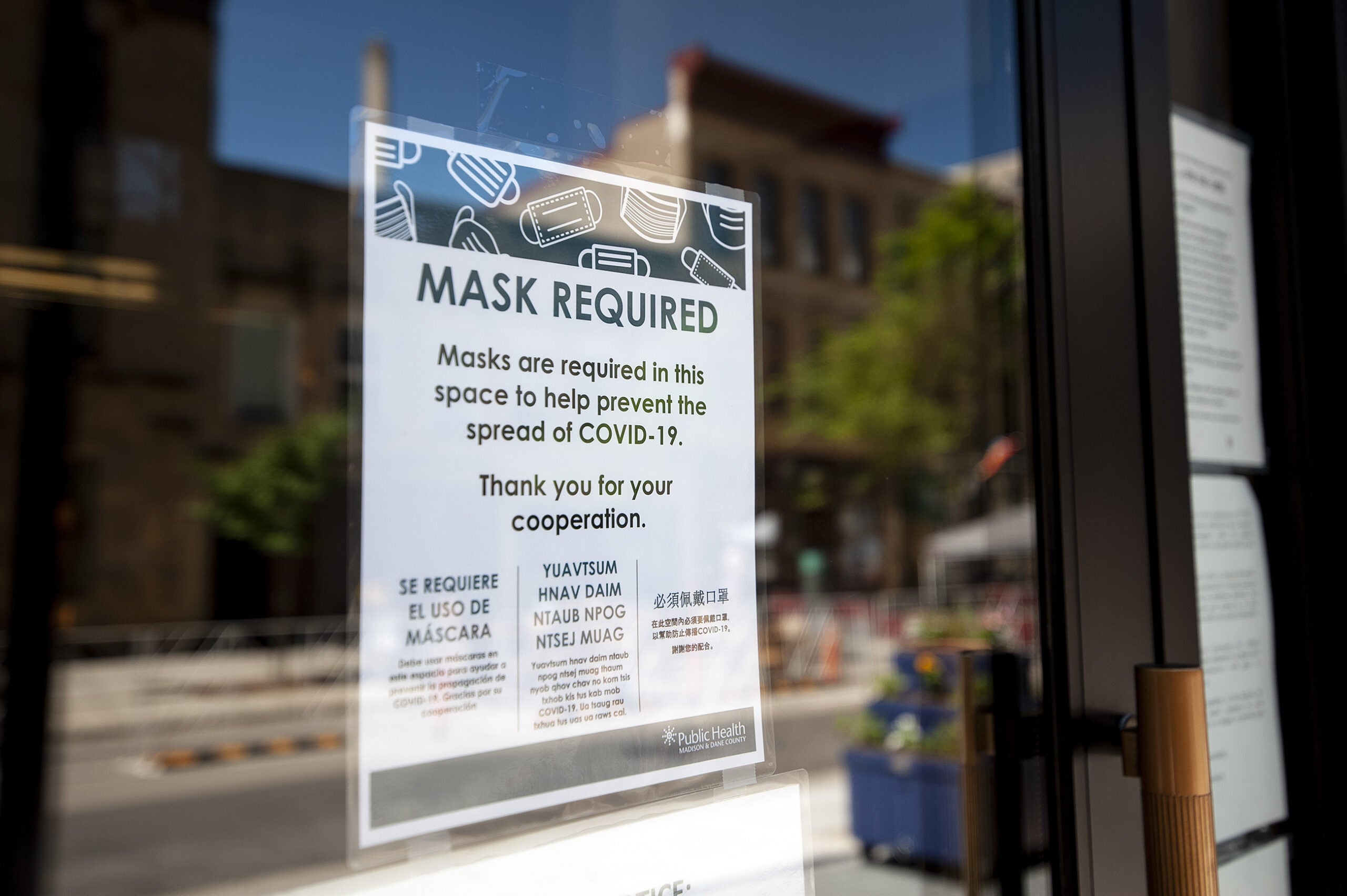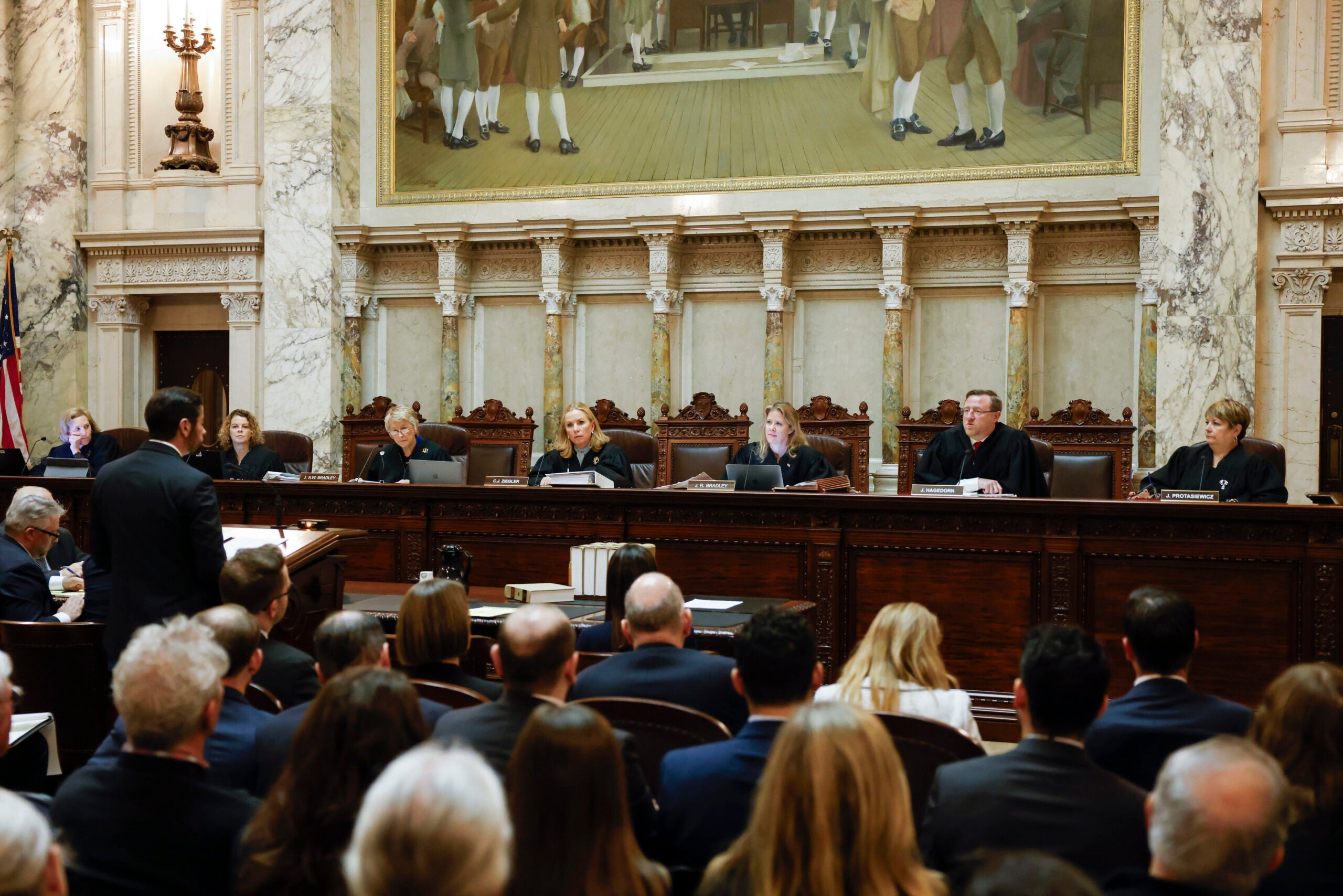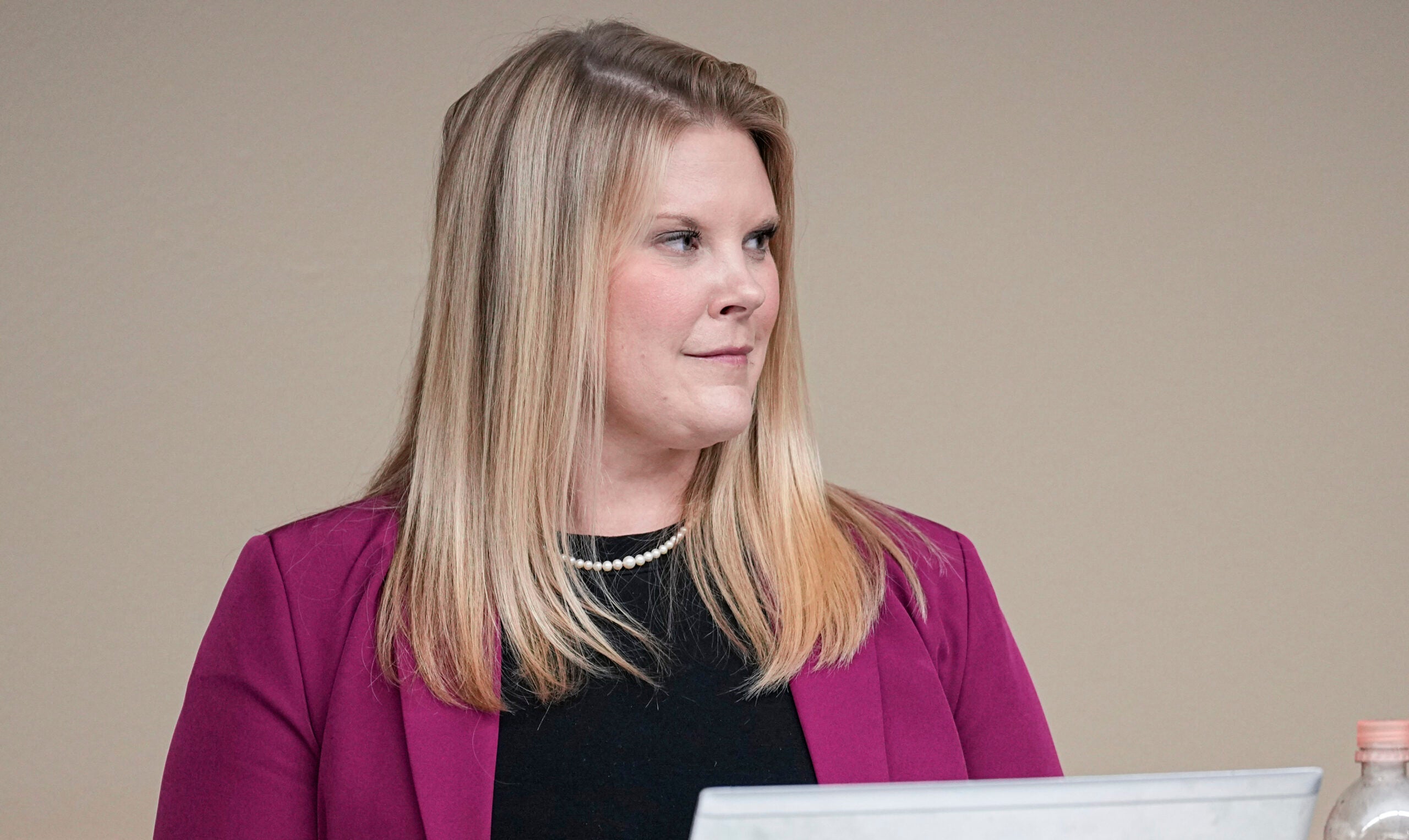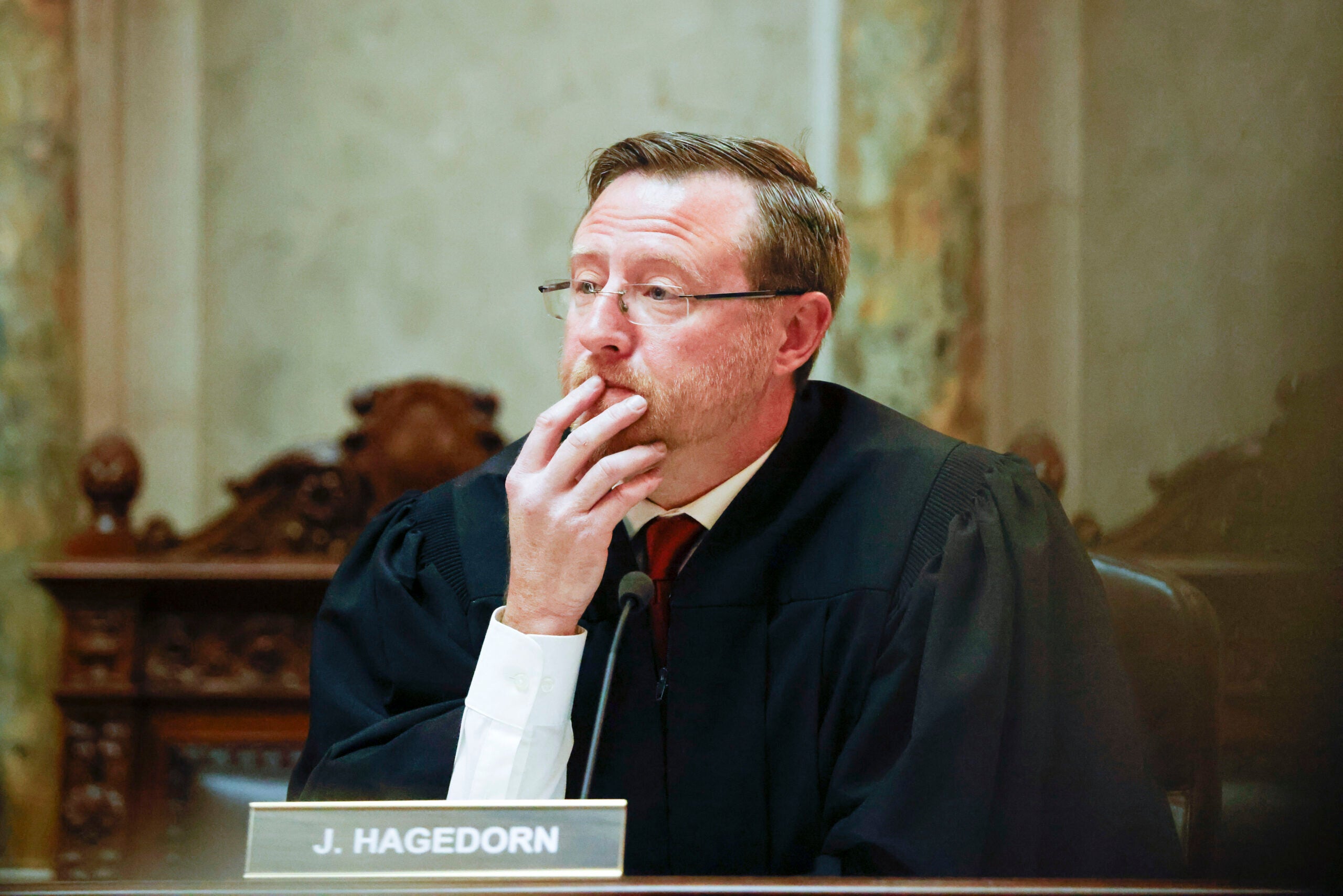Local health officials have the authority to issue public health orders and issue fines to enforce them without permission from local elected officials, the Wisconsin Supreme Court ruled on Friday.
Supreme Court Justice Brian Hagedorn, who has been a swing vote on the court, joined three liberal justices in the 4-3 decision that could have broad implications for the authority of local health officers in future public health emergencies.
The ruling stemmed from a case that was brought by two families of young athletes and a Dane County dance studio that was accused of being overcapacity in December 2020. At the time, there was a prohibition on indoor gatherings of any size following a fall surge in COVID-19 cases that year. They filed a lawsuit against Dane County, the local health department and Dane County’s health director Janel Heinrich that challenged the health order.
Stay informed on the latest news
Sign up for WPR’s email newsletter.
Dane County ruled against the plaintiffs, who petitioned to bypass the court of appeals. The Wisconsin Supreme Court granted their request and agreed to hear the case.
“Heinrich responded to the appearance of the communicable COVID-19 disease in her territory by issuing a series of orders from May 2020 until March 2022 that implemented measures to prevent, suppress, and control the disease’s spread,” Justice Jill Karofsky wrote for the majority. “She did so pursuant to her authority under state law.”
Karofsky went on to say that the law allows local health officers to “promptly take all measures necessary” to respond to communicable diseases like COVID-19. The liberal-leaning justice took aim at the conservative minority for disparaging Heinrich in their dissent, implying that the health officer is a “tyrant, an autocrat, a dictator, and a despot.”
Madison Mayor Satya Rhodes-Conway told WPR the actions public health officers took were appropriate and justified.
“It’s very important for us to trust science, to trust the public health experts, and to give them the ability to react swiftly when they need to,” said Rhodes-Conway.
Public Health Madison & Dane County said in a statement that health officials are pleased with the court’s decision, noting their actions resulted in “one of the lowest rates of illness and hospitalizations in the state.”
Opponents had argued Dane County health officials took steps to limit spread of the virus beyond what was allowed by state law, saying the public health order should have been approved by local elected officials. The challenge mounted by families and the dance studio came during one of the worst waves of the pandemic and prior to widespread availability of vaccines that have helped protect people from hospitalization or death due to the virus.
Dane County executive Joe Parisi told WPR that seeking approval of pandemic restrictions from local elected officials would have caused critical delays in efforts to curb the spread of the disease.
“Our team has been confident from the start that public health has been working within the guidelines set forth in state statute,” said Parisi. “It will be my hope that they’re able to continue to do the job that they do so well, and that other health departments are allowed to do their jobs as well.”
Rick Esenberg, president of the conservative Wisconsin Institute for Law and Liberty, told WPR there should be some guidance from elected officials.
“It’s one thing to act on an emergency basis. It’s another thing to simply say to public health officials, ‘Look. You make the rules. We’re not going to tell you what to do,’ and allow that situation to go on indefinitely,” said Esenberg.
The conservative law firm, which represented families in the case, said in a statement they’re disappointed the court refused to take steps to ensure accountability for health officers. The group noted that the court signaled individual orders may come under more scrutiny, adding the decision didn’t address fines issued to the dance studio for violating the public health order.
“We intend to continue vigorously challenging those fines,” said WILL attorney Luke Berg.
Hagedorn rejected petitioners’ claims in the case that Wisconsin law wrongfully delegated power to local health officers and that the county’s ordinance enforcing the health order unlawfully transferred local authority to Heinrich.
“When the Wisconsin Constitution was ratified, those participating in state government did not appear to understand the constitution to forbid giving local officials charged with protecting public health the authority to issue at least some orders of indeterminate character. Nor was it understood to be problematic if those orders were enforceable…. If this arrangement on its face did not run afoul of the constitutional separation of powers in 1849, it is hard to see why it would today,” Hagedorn wrote.
Three conservative justices dissented on the ruling. Justice Rebecca Bradley said the court has long held that the Wisconsin Constitution doesn’t allow county boards to delegate power to others, such as local health officers. In her dissent, Bradley said Heinrich exercised powers like a dictator by forbidding gatherings and requiring face masks.
“Rather than respond to any of the legal analysis in this dissent, the majority instead castigates its author for characterizing Heinrich’s actions in terms of tyranny, autocracy, dictatorship, and despotism,” wrote Bradley for the minority. “There are no more fitting words to describe the arrogation of power Heinrich wields.”
Despite the ruling, Hagedorn stressed it doesn’t mean public health orders are immune to legal challenges. He noted the question before justices in this case was whether state law allows public health orders — not whether a particular order goes too far.
The court previously ruled against Gov. Tony Evers last year when it struck down the governor’s ability to issue repeated emergency declarations related to the COVID-19 pandemic, ending a statewide mask mandate.
Under state law, governors have the power to issue public health emergencies that can only last for 60 days unless extended by the state Legislature. Evers issued several emergencies related to the COVID-19 pandemic since March 2020. None of them were extended by the Republican-controlled Legislature.
Sen. Steve Nass, R-Whitewater, said in a statement Friday that the ruling should prompt the Republican-controlled Legislature to repeal the authority that’s granted to public health officers under Wisconsin law.
“While this ruling opens the door for extreme abuse by local public health officials in the coming days and weeks, the good news is that the ruling of the state Supreme Court can be overturned early in 2023 by the Republican legislature and a new Republican governor,” said Nass. “The existing flawed state statutes relating to local public health departments must be repealed and that can only be achieved if Wisconsin has a new governor in 2023.”
Wisconsin Public Radio, © Copyright 2025, Board of Regents of the University of Wisconsin System and Wisconsin Educational Communications Board.





